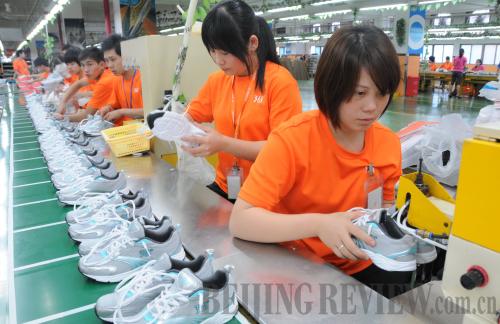|
 |
|
ON THE RIGHT PATH: Workers make sports shoes at a factory of Jinjiang, Fujian Province (LIN SHANCHUAN) |
The whole year
Experts predict the economic situation in the second half will be better than the first and the GDP growth is likely to be more than 8 percent.
"The general trend of Chinese economic development has not changed," said Zhu Baoliang, a researcher at the State Information Center. Zhu predicted that Chinese economic growth will pick up in the third quarter and continue to grow in the fourth quarter.
Lian also said economic growth will see an upturn in the third quarter because of four factors: recovering export growth alleviating worries of a rapid economic downturn; recovering growth of investment in real estate and infrastructure helping to stabilize growth of fixed-asset investment; policy stimulus and slower growth of prices will be conducive to the stable growth of consumption; and the financial sector is offering bigger backup to the real economy.
Zhang said this year's economic situation will see "a drop in the first half but stability in the second half."
The way in which policies of stabilizing economic growth are implemented will be decisive to the outcome of the second half, said Zhang. He suggested that structural tax reduction policy continue to be carried out to alleviate tax burdens on enterprises. Prudent monetary policy should be continued so as to sustain a reasonable financing scale. Credit structure should be further optimized to better satisfy the demand of the real economy.
Expanding domestic demand should be the focus to promote economic growth in the second half, said Zhang. The government should improve the policies of stimulating consumption, such as subsidies to energy-saving products, and supporting new energy products to be applied by public facilities and households. The government has arranged more than 26 billion yuan ($4.11 billion) to subsidize sale of energy-saving home appliances.
A report by Anbound, a Beijing-based independent consulting firm, warned the government of a rebound of housing prices in the second half, which could affect sound economic development. In June, a blowout of transaction volume and slight housing price hikes in major cities intensified such worries.
Yi Xianrong, a researcher at the Institute of Finance and Banking of the Chinese Academy of Social Sciences, said housing prices in major cities stopped dropping in June. This is not because of so-called "rigid demand" of home purchases, but that a series of measures to stabilize growth has changed expectations on the real estate market.
If China's housing market sees a simultaneous increase of transaction volume and prices, macro-control measures on the market implemented two years ago will ultimately fail, said Yi.
"If the central bank further relaxes the monetary policy in the second half, the already big real estate bubbles will continue to expand, while risks brought by the bubbles will be much larger than the benefits brought by stabilizing economic growth," Yi said.
| 